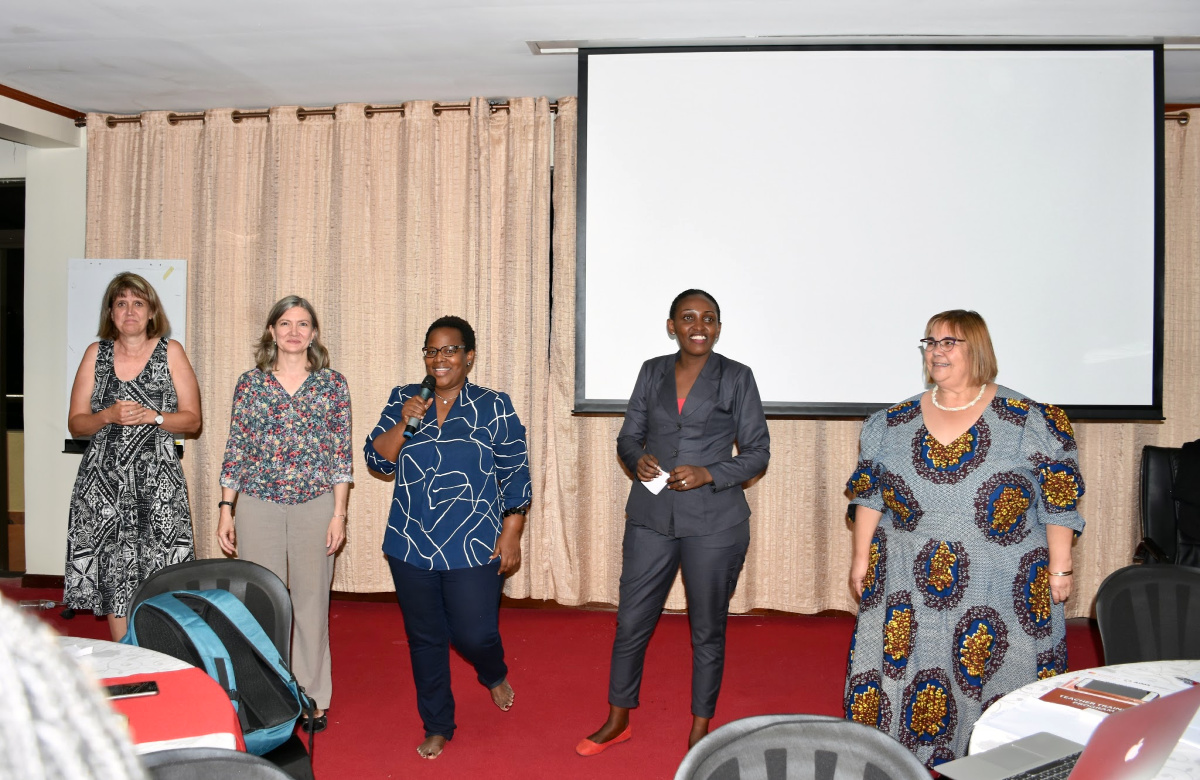For many, summer is a time for camping, outdoor sports and cold drinks on a warm patio. But for educators, summer isn't always about winding down—it's about catching up on research and writing, travelling to international conferences, and devoting time to exciting projects.
This summer, faculty members Florence Glanfield and Jerine Pegg, and doctoral candidate Kerry Rose took their research to the heart of Africa for two weeks. In Rwanda they worked with the African Institute for Mathematical Sciences to lead multi-day sessions on assessment for 150 math and science educators and subject-specific scientific inquiry sessions for 60 school leaders. Glanfield also advised the African Institute for Mathematical Sciences (AIMS) Teacher Training Program on the development of policy briefs. The trio also made the local news, twice!
Each of the three scholars shared their memories of the trip, as well as the Kinyarwandan name the locals gave them.
Florence Glanfield, Professor in Secondary Education (Munezero - Happiness)
I was inspired by the experience of working with secondary mathematics and science teachers from across Rwanda and with the AIMS Teacher Training Program. Each morning when we gathered a song in the national language, Kinyarwanda, would be sung to bring us together. The school curriculum engages teachers and youth in the country in four languages: Kinyarwanda, English, French and Kiswahili. As we worked together around language related to assessment and evaluation and the meanings I realized the amount of meaning-making that had to occur for our colleagues. I was speaking in English, but they were thinking and hearing in multiple languages. I was inspired by their commitment and dedication as they navigated the multilingual educational landscape.
I was also inspired by the work of reconciliation that has occurred in the country. This year is the 25th commemoration of the genocide against the Tutsi. Everywhere I looked I saw the slogan "Kwibuka 25: remember - unite - renew." It was especially poignant as I visited the Kigali Genocide Memorial and realized the reconciliation work that's been done in the country. I wondered what Canada could learn from Rwanda in its reconciliation journey.
Kerry Rose, Doctoral Candidate in Secondary Education (Amahoro - Peace)
Working with chemistry teachers in a tent by the pool in Kigali may be a novel experience, but it does not take long for educators to find common struggles and successes. In Rwanda, science teachers experience many of the same pressures as teachers in Alberta: a prevalence of standardized testing, a curriculum packed with outcomes, and large classes.
Rwandan teachers also face some challenges that Albertan teachers typically do not. Many schools have no or little internet access (or in some cases, electricity), and students typically do not have access to computers, or even basic lab equipment like beakers, standard chemicals or even distilled water. Teachers are often teaching in their second or third language to students who are trying to learn in their second or third language. Class sizes top 60 students in many cases, and there are usually no photocopiers or projectors available. But Rwanda has made some amazing recent strides in universal education, and—as in Alberta—teachers are seeking strategies to help all of their students connect to and learn science.
Working with teachers who routinely overcome such challenges, and who are so committed to their students’ well-being and future prospects was inspiring. The entire room (or tent in my case) would often break into spontaneous song and dance to celebrate their learning. This often brought me close to tears. Teachers being resourceful, innovative, and concerned for the future of their students took on a whole new dimension for me in this context, but also showed me that these are universal places where teachers can meet and share.
Jerine Pegg, Chair of Elementary Education (Rugwiro - Sociable, Enthusiastic)
I truly enjoyed the opportunity to work collaboratively with Dr. Herine Adhiambo Otieno and her team at the AIMS Teacher Training Program in Rwanda. The two weeks we spent working with the AIMS team gave us the opportunity to better understand the educational context in Rwanda, the Teacher Training Program program objectives, and how we could best support them during our visit.
I was inspired by the teachers' enthusiasm and dedication to improve their practice. Since the workshop we have continued to receive updates from Dr. Otieno with pictures that the teachers have sent showing them back in their schools and districts sharing what they have learned with their colleagues.
The people of Rwanda have not forgotten their history, but what was clear to me from my time there is that they also have not let it define them. They are working towards making a better future for their country and their students and that is inspiring. I look forward to future possibilities to continue the collaboration with the AIMS Teacher Training Program and the teachers in Rwanda.
Photo caption: From left: Kerry Rose (doctoral student, Secondary Education and CMASTE project coordinator), Jerine Pegg (chair, Elementary Education), Herine Adhiambo Otieno (director, African Institute for Mathematical Sciences), Sylvie Ingabire (teacher, FAWE Girls’ Secondary School) and Florence Glanfield (outgoing chair, Secondary Education) present to math and science teachers at the AIMS Teaching Training Program in Kigali, Rwanda.
